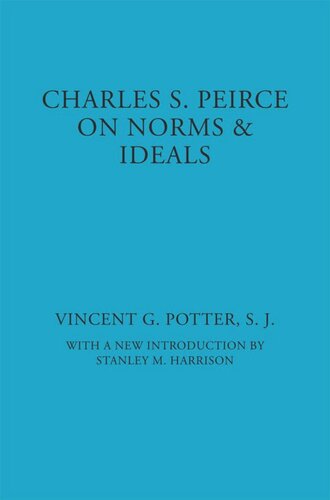

Most ebook files are in PDF format, so you can easily read them using various software such as Foxit Reader or directly on the Google Chrome browser.
Some ebook files are released by publishers in other formats such as .awz, .mobi, .epub, .fb2, etc. You may need to install specific software to read these formats on mobile/PC, such as Calibre.
Please read the tutorial at this link: https://ebookbell.com/faq
We offer FREE conversion to the popular formats you request; however, this may take some time. Therefore, right after payment, please email us, and we will try to provide the service as quickly as possible.
For some exceptional file formats or broken links (if any), please refrain from opening any disputes. Instead, email us first, and we will try to assist within a maximum of 6 hours.
EbookBell Team

4.1
60 reviewsIn recent years, Charles Sanders Peirce has emerged, in the eyes of philosophers both in America and abroad, as one of America’s major philosophical thinkers. His work has forced us back to philosophical reflection about those basic issues that inevitably confront us as human beings, especially in an age of science. Peirce’s concern for experience, for what is actually encountered, means that his philosophy, even in its most technical aspects, forms a reflective commentary on actual life and on the world in which it is lived.
In Charles S. Peirce: On Norms and Ideals, Potter argues that Peirce’s doctrine of the normative sciences is essential to his pragmatism. No part of Peirce’s philosophy is bolder than his attempt to establish esthetics, ethics, and logic as the three normative sciences and to argue for the priority of esthetics among the trio. Logic, Potter cites, is normative because it governs thought and aims at truth; ethics is normative because it analyzes the ends to which thought should be directed; esthetics is normative and fundamental because it considers what it means to be an end of something good in itself. This study shows that pierce took seriously the trinity of normative sciences and demonstrates that these categories apply both to the conduct of man and to the workings of the cosmos.
Professor Potter combines sympathetic and informed exposition with straightforward criticism and he deals in a sensible manner with the gaps and inconsistencies in Peirce’s thought. His study shows that Peirce was above all a cosmological and ontological thinker, one who combined science both as a method and as result with a conception of reasonable actions to form a comprehensive theory of reality. Peirce’s pragmatism, although it has to do with "action and the achievement of results, is not a glorification of action but rather a theory of the dynamic nature of things in which the "ideal" dimension of reality – laws, nature of things, tendencies, and ends – has genuine power for directing the cosmic order, including man, toward reasonable goals.